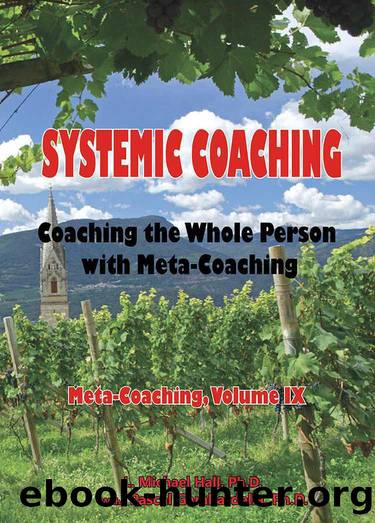Systemic Coaching (Meta-Coaching Book 9) by Hall L. Michael

Author:Hall, L. Michael [Hall, L. Michael]
Language: eng
Format: epub
Publisher: Unknown
Published: 2013-03-15T16:00:00+00:00
Figure 11:2
Holon of an atom
that’s a whole and yet a part of a molecule which is a whole yet part of a cell which is a whole and yet part of an organism.
System Artifacts
What are some of the artifacts that result from the presence of a human system? What artifacts can you, as a coach, look to and use to detect your client’s system?
1) Symptoms — a Negative System Artifact
Symptoms of distress and dysfunction are signs of the presence of an ineffective system. In such systems you will find long-lasting, entrenched, and ingrained patterns that are not working. As a result, the pattern of the system generates symptoms. Apart from the pain and problems that symptoms generate, there are valuable insights to be harvested about the system. In fact, you can use symptoms to detect the pattern (or patterns) which is the actual problem. They can suggest the location of leverage points for change.
Valuable information about a system can be discovered in symptoms just as they can in conflict, the violation of boundaries, mis-communication, distorted communication, and negative emotions (anxiety, worry, fear, distress, disappointment, unmotivated, procrastination, resentment, silent treatment, secrets, intimidation, aggressiveness, competitiveness, etc.). To tap into this valuable information, embrace the symptoms and explore them to discover a pathway into a person’s matrix.
• Is this a cause or a symptom?
• Is this a symptomatic problem?
• Where is the leverage point that governs this symptom?
• It is a symptom of what?
• What are the symptomatic solutions that I’m tempted to use?
• Is this an attempted solution that worked briefly and that then
failed?
Do problems like these imply that we have shifted from coaching to therapy? That’s a good question. To answer I will make a simple assertion, namely, psychologically healthy people who are wanting to actualize their highest and best also experience these kind of problems in life. These are not particularly problems for people who need therapy. The question that more importantly points to therapy are these:
• Does a given person have the ego strength to face the problem and
work through it to a resolution?
• Does the person have a strong enough sense of self to not
personalize the problem?
• Does the person live in the present and able to be present or does the
person live in the past?
• Is the person still traumatized by something in the past and has not
come to terms with it and released it?
Symptomology offers valuable insights and communication about a Matrix system. Symptoms signal that something is wrong—and what’s wrong are the frames that create the pattern that drives the system. Symptoms are often frozen sequences of behaviors that have repetitively habituated an attempted solution that didn’t work. Symptoms then can block resources and they indicate where a Matrix (or belief system) has ceased to function effectively.
Welcome symptoms with open arms so that you first discover that it is a symptom and then explore it for what it means in terms of the structure of the system. Embrace each and every symptom as if it might be the door that takes you right into the heart of the Matrix.
Download
This site does not store any files on its server. We only index and link to content provided by other sites. Please contact the content providers to delete copyright contents if any and email us, we'll remove relevant links or contents immediately.
Rewire Your Anxious Brain by Catherine M. Pittman(18496)
Talking to Strangers by Malcolm Gladwell(13144)
The Art of Thinking Clearly by Rolf Dobelli(10150)
Mindhunter: Inside the FBI's Elite Serial Crime Unit by John E. Douglas & Mark Olshaker(9113)
Becoming Supernatural by Dr. Joe Dispenza(8047)
Change Your Questions, Change Your Life by Marilee Adams(7574)
The Road Less Traveled by M. Scott Peck(7481)
Nudge - Improving Decisions about Health, Wealth, and Happiness by Thaler Sunstein(7471)
The Lost Art of Listening by Michael P. Nichols(7365)
Mastermind: How to Think Like Sherlock Holmes by Maria Konnikova(7175)
Enlightenment Now: The Case for Reason, Science, Humanism, and Progress by Steven Pinker(7093)
Win Bigly by Scott Adams(7041)
The Way of Zen by Alan W. Watts(6460)
Daring Greatly by Brene Brown(6376)
Big Magic: Creative Living Beyond Fear by Elizabeth Gilbert(5562)
Grit by Angela Duckworth(5456)
Ego Is the Enemy by Ryan Holiday(5236)
Men In Love by Nancy Friday(5121)
Altered Sensations by David Pantalony(5013)
